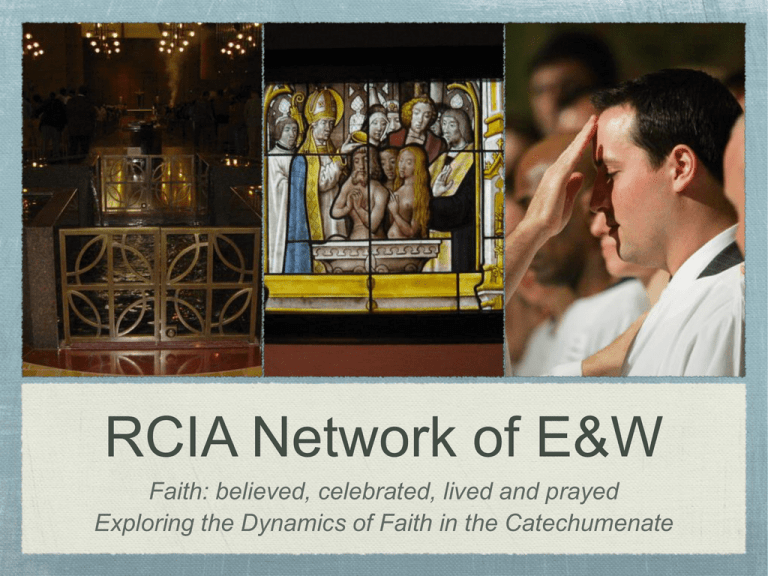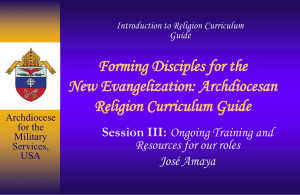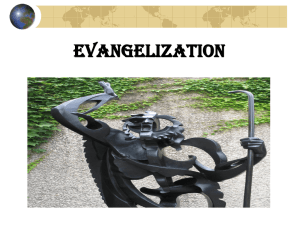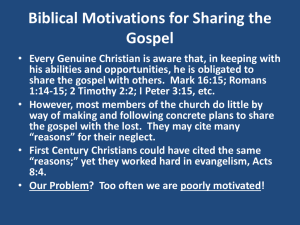PPT - RCIA Network
advertisement

RCIA Network of E&W Faith: believed, celebrated, lived and prayed Exploring the Dynamics of Faith in the Catechumenate Outline of Presentations An overview of the catechetical plan of the RCIA 75/1 doctrine 75/2 liturgy 75/3 community 75/4 evangelization The catechetical plan Evangelization The catechumenate Purification and Enlightenment Mystagogy Preliminary remark It’s a “Rite” Evangelization 36 Although the rite of initiation begins with admission to the catechumenate, the preceding period or precatechumenate is of great importance and as a rule should not be omitted. It is a time of evangelization: faithfully and constantly the living God is proclaimed and Jesus Christ whom he has sent for the salvation of all. Thus those who are not yet Christians, their hearts opened by the Holy Spirit, may believe and be freely converted to the Lord and commit themselves sincerely to him. For he who is the way, the truth, and the life fulfils all their spiritual expectations, indeed infinitely surpasses them. Reflection question In my experience of those beginning their journey of the Catholic faith, what is their level of belief in the living God? in Jesus Christ? 38 During this period, priests and deacons, catechists and other laypersons are to give the candidates a suitable explanation of the Gospel (see no. 42). The candidates are to receive help and attention so that with a purified and clearer intention they may cooperate with God’s grace. Opportunities should be provided for them to meet families and other groups of Christians. Reflection questions During the precatechumenate, what would constitute “a suitable explanation of the Gospel”? In my experience, what of the sympathisers’ intentions need to become “purified and clearer”? How are they meeting families and other Christians? RCIA 40 During the precatechumenate period, parish priests (pastors) should help those taking part in it with prayers suited to them, for example, by celebrating for their spiritual well-being the prayers of exorcism and the blessings given in the ritual. Reflection questions In my community, is the priest involved with prayers of exorcism and blessing during the precatechumenate? Is this important? 42 The prerequisite for making this first step is that the beginnings of the spiritual life and the fundamentals of Christian teaching have taken root in the candidates. Thus there must be evidence of the first faith that was conceived during the period of evangelization and precatechumenate and of an initial conversion and intention to change their lives and to enter into a relationship with God in Christ. Consequently, there must also be evidence of the first stirrings of repentance, a start to the practice of calling upon God in prayer, a sense of the Church, and some experience of the company and spirit of Christians through contact with a priest or with members of the community. The candidate should also be instructed about the celebration of the liturgical rite of acceptance. Reflection questions How much time might be necessary to accomplish the goals of the precatechumenate? Can these goals reasonably be met at different times of the year in the same parish? 43 Before the rite is celebrated, therefore, sufficient and necessary time, as required in each case, should be set aside to evaluate and, if necessary, to purify the candidates’ motives and dispositions. With the help of the sponsors (see no. 10), catechists, and deacons, parish priests (pastors) have the responsibility for judging the outward indications of such dispositions. Reflection question In your community, how do you decide that someone is ready for the Rite of Acceptance into the Order of Catechumens? Evangelization catechesis Proclaim the living God and Jesus Christ Invite a commitment to the Lord Explain the gospel Purify intentions Provide meetings with Christians Pray with priests Look for fundamentals The Catechumenate Catechesis 75/1 A suitable catechesis is provided - Κατηχηση 75/2 They become familiar with the Christian way of life Κοινονια 75/3 Suitable liturgical rites purify and strengthen them Λειτυργια 75/4 Catechumens spread the gospel - Διακονια Purification Enlightenment & RCIA 125 For both the elect and the local community, therefore, the Lenten season is a time for spiritual recollection in preparation for the celebration of the paschal mystery. Reflection question This past Lent, in what ways did your entire community offer spiritual recollection in preparation for Easter? RCIA 126 This is a period of more intense spiritual preparation, consisting more in interior reflection than in catechetical instruction, and is intended to purify the minds and hearts of the elect as they search their own consciences and do penance. This period is intended as well to enlighten the minds and hearts of the elect with a deeper knowledge of Christ the Saviour. The celebration of certain rites, particularly the scrutinies and the presentations, brings about this process of purification and enlightenment and extends it over the course of the entire Lenten season. Reflection question Is the period of purification and enlightenment in your community truly centered on “interior reflection” more than “catechetical instruction”? Does the catechetical plan shift during Lent? Other rites during period Scrutinies Presentations Preparation Rites Reflection questions How do you prepare for the scrutinies of thirst, sight, and life? How do you prepare to present the Creed and the Lord’s Prayer? How are the elect made spiritually ready for the return of the creed, the ephphetha, the baptismal name, the anointing, the baptismal fast? Purification/Enlightenment Spiritual recollection More interior reflection than catechetical instruction Purify minds and hearts Enlighten with deeper knowledge of Christ Celebration of certain rites Mystagogy 234 This is a time for the community and the neophytes together to grow in deepening their grasp of the paschal mystery and in making it part of their lives through meditation on the Gospel, sharing in the eucharist, and doing the works of charity. RCIA 234 To strengthen the neophytes as they begin to walk in newness of life, the community of the faithful, their godparents, and their parish priests (pastors) should give them thoughtful and friendly help. After initiation each year, how does the community meditate on the Gospel, share in the eucharist, and do works of charity? Who is involved? 235 The neophytes are, as the term ‘mystagogy’ suggests, introduced into a fuller and more effective understanding of mysteries through the Gospel message they have learned and above all through their experience of the sacraments they have received. For they have truly been renewed in mind, tasted more deeply the sweetness of God’s word, received the fellowship of the Holy Spirit, and grown to know the goodness of the Lord. Mystagogical Catechesis Deepen grasp of the paschal mystery Share the eucharist Do works of charity The Catechetical Plan Precatechumenate - proclaiming the living God Catechumenate - fourfold plan Purification & Enlightenment - spiritual preparation Mystagogy - participation in the sacraments











